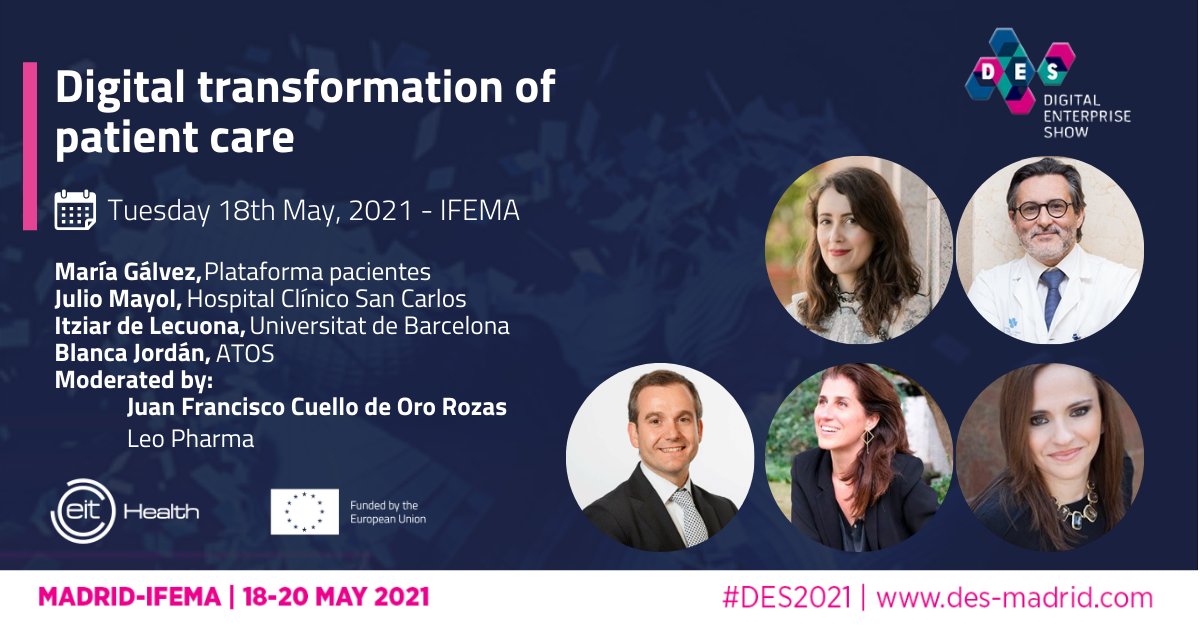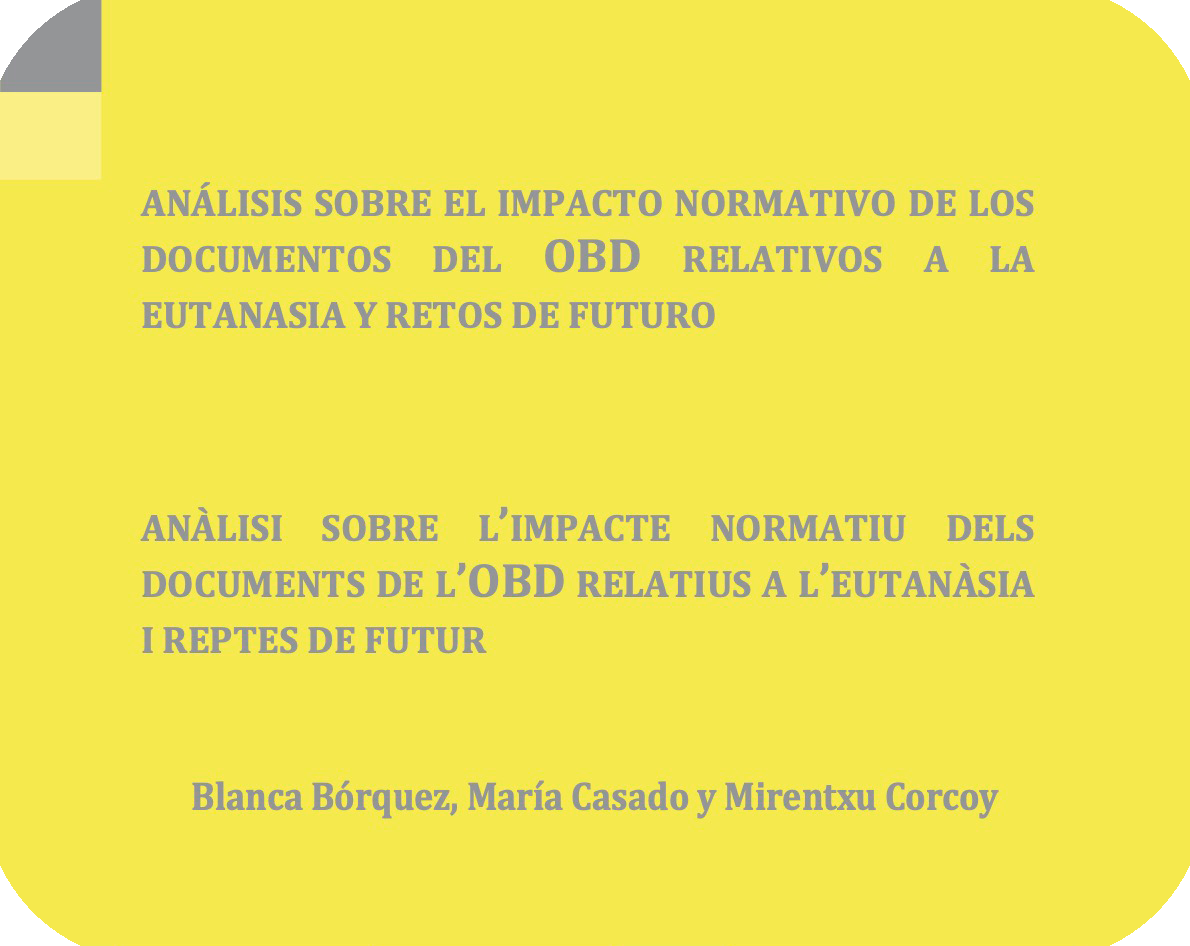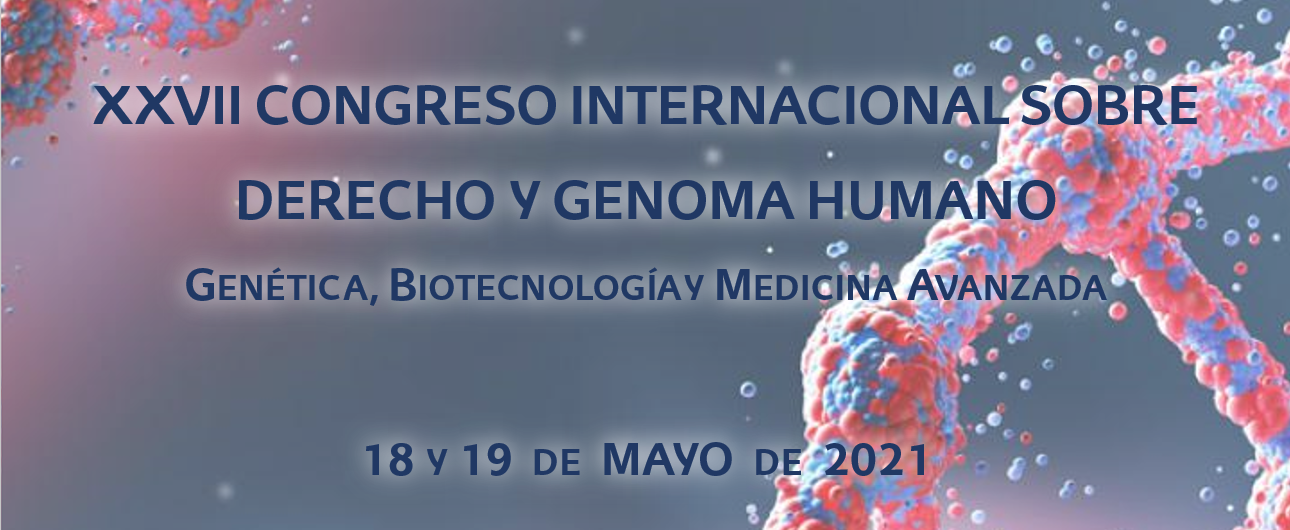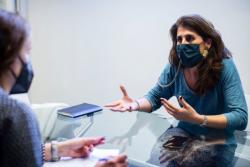The Bioethics and Law Obs.
Master in Bioethics and Law
UNESCO Chair in Bioethics
Contact
- Bioethics and Law Observatory
- UNESCO Chair in Bioethics
- University of Barcelona
- Faculty of Law
- Ave. Diagonal, 684
- 08034 Barcelona
- (+34) 93 403 45 46
- obd.ub@ub.edu
- Master in Bioethics and Law
- (+34) 93 403 45 46
- master.bd@ub.edu
RSS del Observatori de Bioètica i Dret UB
-
Debate "The social, ethical and technological challenges of sex and gender bias in AI and healthcare", with Itziar de Lecuona
On May 11, 2021, Itziar de Lecuona, director of the Bioethics and Law Observatory and professor at the Master in Bioethics and Law and at the Department of Medicine of the University of Barcelona, took part in the debate "The social, ethical and technological challenges of sex and gender bias in AI and healthcare", organized by the Barcelona Supercomputing Center (BSC) in collaboration with Obra Social "La Caixa".
-
16th World Congress of Bioethics: "Bioethics post Covid-19: Responsibility and transparency in a globalized and interconnected world"
[[{"type":"media","view_mode":"media_original","fid":"2604","attributes":{"alt":"","class":"media-image","height":"238","style":"font-size: 13.008px; width: 600px; height: 128px;","width":"1120"}}]]
From July 20 to 22, 2022, the 16th World Congress of Bioethics will take place in Basel, Switzerland, and will be held both in person and virtually. The Institute for Biomedical Ethics will host this edition, which will revolve around the theme "Bioethics post Covid-19: Responsibility and transparency in a globalized and interconnected world".During the three days, anyone can participate, in person or virtually, in different debates and discussions on topics related to bioethics. Until September 30, 2021 (call is closed), proposals for contributions and panel sessions can be submitted. See all the information and guidelines about the call here.
In addition, within the framework of this event, two other meetings will be held:- Congress of the Feminist Approaches to Bioethics (FAB) on July 18 and 19.
- Sessions of the Ibero-American Network of Bioethics on July 20 and 22. For these sessions, a call for abstracts is open until May 15, 2022 (call is closed).
Dr. Fabiola Leyton, associate professor at the Faculty of Medicine of the University of Barcelona, postdoctoral researcher at the Bioethics and Law Observatory and editorial coordinator of the Bioethics and Law Journal, will participate in two sessions on Wednesday, July 20, 2022:- Presentation "Recommendations for Ethical Decision-Making on Patient Access to Special Care Units in Pandemic Situations", at 8:45 a.m. (time in Basel, UTC+2), part of the panel "Public health during a pandemic".
- Presentation "Anthropocene, climate change, public health ethics and non human animals", at 4:30 p.m. (time in Basel, UTC+2), part of the panel "Public health ethics".
- Date: July 20-22, 2022
- Place: University of Basel (Switzerland), and virtual format
- See program of the Congress
- See calendar and schedules of the Congress
- More information
-
The Data Protection Impact Assessment (DPIA) tool for research and innovation healthcare projects is now available in both English and Spanish
 The tool and methodology to conduct Data Protection Impact Assessments (DPIA) in the healthcare field are now available in open access both in Spanish and English.
The tool and methodology to conduct Data Protection Impact Assessments (DPIA) in the healthcare field are now available in open access both in Spanish and English.These resources, which were initially published in Catalan, are the result of the collaboration between the Data Protection Officer (DPO) of the Foundation TIC Salut Social and the Bioethics and Law Observatory - UNESCO Chair in Bioethics at the University of Barcelona.
This is an agile tool to conduct DPIAs in research and innovation healthcare projects, based on the model of the Catalan Data Protection Authority. With this initiative, the DPO Office contributes to the standardization of the methodology and criteria to help the healthcare entities to carry out their tasks.
To learn more about this tool, click here.In the following links, you can access the tool in the three languages available:Video of the methodology presentation (in Catalan) -
Round table "Digital transformation of patient care", part of the Digital Enterprise Show
 From May 18 to 20, 2021, the Digital Enterprise Show (#DES2021), a leading event dedicated to digital transformation, will take place at IFEMA MADRID.
From May 18 to 20, 2021, the Digital Enterprise Show (#DES2021), a leading event dedicated to digital transformation, will take place at IFEMA MADRID.On May 18, the round table "Digital transformation of patient care", part of the HealthCare & Life Science sessions organized by EIT Health, will count on the presence of Itziar de Lecuona, director of the Bioethics and Law Observatory and professor at the Master in Bioethics and Law and at the Department of Medicine of the University of Barcelona.
In this panel, participants will discuss about the digital transformation in the health industry, specifically in patient care, and the changes and implications fruit of the redefinition of this process with the incorporation of mobile health solutions, artificial intelligence and radio-frequency identification.
-
Date and time: May 18, 2021, from 4:00 p.m. to 5:00 p.m.
-
Place: Auditorium Mastercard at IFEMA MADRID
-
Language: English
-
Media coverage of the event: "Hacia una atención más personalizada y eficiente de los pacientes a través de la tecnología" (IM Médico)
-
-
Publication of the "Analysis of the normative impact of the Bioethics and Law Observatory's documents related to euthanasia and future challenges"

The Bioethics and Law Observatory has published the "Document of analysis on the normative impact of the Bioethics and Law Observatory's documents related to euthanasia and future challenges". Blanca Bórquez, María Casado and Mirentxu Corcoy analyze the proposals and recommendations that the Observatory has been presenting throughout its 25-year history regarding one's own will to live, assisted suicide and euthanasia, and which have been included in the recent law regulating euthanasia, approved in Spain on March 24, 2021.
An initial version of this document was released in April 2021. The updated and final version was published in June 2021.
- Access the document (only available in Spanish and Catalan for now)
-
27th International Congress on Law and Human Genome

On May 18 and 19, 2021, the Research Group Chair in Law and Human Genome of the University of the Basque Country UPV/EHU is organizing the 27th edition of the "International Congress on Law and Human Genome".
Itziar de Lecuona, Director of the Bioethics and Law Observatory and professor of the Master in Bioethics and Law and the Department of Medicine of the University of Barcelona, is participating in the round table dedicated to Genome Editing (on May 19 from 4:00 p.m. to 6:00 p.m.), to speak specifically about bioethics and genome editing in humans.
-
Date: May 18 and 19, 2021
-
Venue: virtual format through the BBC Collaborate platform
-
Check out the full program here.
-
Free access through this link.
Regarding the theme of this congress, we invite you to read the "Document on bioethics and gene editing in humans", published by the Bioethics and Law Observatory of the University of Barcelona, which reflects on an adequate ethical-legal framework which articulates the enormous potential of genome editing techniques, including the CRISPR technique.
-
-
Appearance of Dr. Itziar de Lecuona at the Senate of Spain
 On April 21, 2021, Dr. Itziar de Lecuona (@itziardelecuona), director of the Bioethics and Law Observatory and professor at the Master in Bioethics and Law and at the Department of Medicine of the University of Barcelona, appears in a session at the Committee of Economic Affairs and Digital Transformation of the Senate of Spain to address the ethical and legal aspects of artificial intelligence.
On April 21, 2021, Dr. Itziar de Lecuona (@itziardelecuona), director of the Bioethics and Law Observatory and professor at the Master in Bioethics and Law and at the Department of Medicine of the University of Barcelona, appears in a session at the Committee of Economic Affairs and Digital Transformation of the Senate of Spain to address the ethical and legal aspects of artificial intelligence.- Date and time: April 21, 2021, at 11:00 a.m.
- More information
-
Interview to Itziar de Lecuona "Ethics for digital society"
 Ethics for digital society. “If privacy is not respected, we are exposed to covert discriminations we will never know of, and which will condition our freedom”.
Ethics for digital society. “If privacy is not respected, we are exposed to covert discriminations we will never know of, and which will condition our freedom”.Itziar de Lecuona, lecturer at the Faculty of Medicine and Health Sciences, has been appointed director of the Observatory on Bioethics and Law of the UB (OBD), interdisciplinary research center of the University of Barcelona that studies bioethical aspects of biomedicine and biotechnology, which celebrates its 25th anniversary and coordinator of the Master in Bioethics and Law of the UB. In the interview, she talks about ethical, legal and social challenges of the digital society.
-
Greater Transparency is Needed
We should not accept not having access to the conditions for purchasing vaccines, on which public centres worked.
Itziar de Lecuona, Associate Professor, School of Medicine and Health Sciences and Assistant Director Bioethics and Law Observatory UNESCO Chair in Bioethics at the University of Barcelona
Protecting the health and welfare of its citizens is a priority for the European Union. To achieve this goal it is necessary to strike a balance between the rights and interests involved. To face up to COVID-19, research should be carried out transparently with a view to obtaining vaccines and distributing them. This way, trust will be generated in science and in the political managers responsible for developing vaccines and making them accessible.
It is a priority task during a pandemic, which requires the participation of different actors with interests that are not always aligned. The public interest often clashes with private interests. The European Union pursues a single competitive market in which health is an asset and not just a commodity. For this, public and private initiatives must go hand in hand. The pharmaceutical industry is however not just any actor; one only has to analyse the applicable laws on medicinal products for human use and take a look at the industry’s parliamentary lobbies to realize how influential it is.
Biomedical research in which people take part, and in which biological samples of human origin and personal data are used, must meet a series of methodological, ethical and legal requirements that are assessed fundamentally by research ethics committees. These have to check that the proposed intervention complies with the criteria of scientific validity, social relevance and respect for the rights of those taking part – and their autonomy to make decisions, after receiving the appropriate information about the possible benefits and risks involved in the research.
The benefits must be maximized and the risks minimized. Furthermore, the research must respect the principle of justice in the recruitment of participants, in access to the results, and in the sharing of benefits from any scientific research – the vaccine in this case, and not just for Europeans! Moreover, the principle of transparency makes it necessary to identify and avoid possible conflicts of interest of researchers and research institutes.
The law establishes that the data from clinical trials must be registered on public databases and that their results – both positive and negative – should be published in scientific journals. In Europe we still do not have a public database, even though it has been legally green-lighted since 2014! These examples make it possible to gauge the existing tensions.
It is time to demand compliance with these requirements, which are applicable with and without COVID-19; to bring science closer to society and to establish a real dialogue between the different actors. This is not happening. The European Union promotes “responsible research and innovation”, at the heart of which is the public’s engagement in the processes of creation and knowledge transfer, as well as ethics, open access, gender equality and scientific education. It is unacceptable for the health commissioner to refuse to disclose the agreements made with different pharmaceutical companies to purchase vaccines in advance, despite the fact that the European Parliament has called for greater transparency in these matters.
Research in our field is carried out in public and private institutions, and is funded largely by the taxpayers. They could be invited to participate as human subjects in clinical trials to develop vaccines out of solidarity to test them and to check interventions and treatments that could be directly or indirectly beneficial. The merit of developing vaccines cannot be attributed solely and exclusively to the pharmaceutical industry. The work of cutting-edge research teams from public and private centres, which the industry identifies to promote clinical trials, must also be acknowledged. Then there are the patients and the healthy volunteers who are prepared to take part.
Research to develop medicines and vaccines is therefore a shared social responsibility to meet the most pressing needs of our time. We should therefore not accept not having access to the criteria and the conditions in the contracts negotiated by the European Union for purchasing and distributing vaccines. Nor should we continue in our state of ignorance about how the processes of research and knowledge transfer work in health. Information and scientific education could help us to make free and informed decisions in order to move forward in the management of the pandemic.
- Opinion article published in El Periódico on 23 december 2020.
-
Dr Itziar de Lecuona takes over as director of the Bioethics and Law Observatory, a research centre of the University of Barcelona
 Within the framework of the 15th International Seminar of the UNESCO Chair in Bioethics of the University of Barcelona, Dr María Casado –the founder and director of the Bioethics and Law Observatory (OBD) since it was created– has announced the appointment of Dr Itziar de Lecuona as the new director of the OBD.
Within the framework of the 15th International Seminar of the UNESCO Chair in Bioethics of the University of Barcelona, Dr María Casado –the founder and director of the Bioethics and Law Observatory (OBD) since it was created– has announced the appointment of Dr Itziar de Lecuona as the new director of the OBD.Itziar de Lecuona (Barcelona, 1976) has a PhD in Law and a Master’s degree in Bioethics and Law from the University of Barcelona (UB). She began her academic career at the UB in 2001. She is an Associate Professor in the Department of Medicine and the Academic Secretary of the UB Faculty of Medicine and Health Sciences. Since 2014, Dr De Lecuona has been the deputy director of the OBD, where she has contributed to create and consolidate lines of research and teaching in bioethics, as well as the centre’s international projection.
Dr de Lecuona has achieved excellent merits in university research, teaching, knowledge transfer and management: she has two acknowledged six-year periods of research and the highest qualification (AA) according to the University of Barcelona’s Academic Dedication Plan. She is work package leader of the ethical, legal and social aspects of two European projects (Horizon 2020) in the field of biomedicine, as well as other non-competitive research projects. She has published monographs and articles in journals indexed in the main quality repositories; she has been a speaker at international conferences of renowned prestige in bioethics and a visiting researcher at the UNESCO Bioethics Programme in Paris, the University of Bologna’s CIRSFID Bioethics Research Centre, and the Carlos III Institute of Health in Madrid. Since 2012, Dr De Lecuona has been a member of the Research Integrity Policy Group of the prestigious League of European Research Universities (LERU), on behalf of the University of Barcelona. A former member of the Ethics Committee of Catalonia and of the Hospital Clínic’s Research Ethics Committee in Barcelona, she is currently a member of the UB’s Bioethics Committee, and of the Ethics Committee of the Polytechnic University of Catalonia, the IDIBELL Research Integrity Committee, and the Ministry of Science and Innovation’s Multidisciplinary Working Group (GTM) on scientific matters related to COVID-19.
We wish Dr de Lecuona all the very best in her new post, and that under her direction the OBD will continue to be a nationally and internationally acknowledged point of reference in bioethics.




